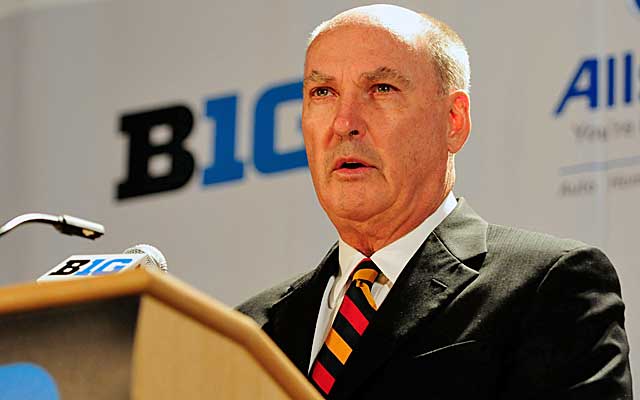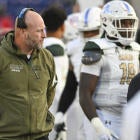
The Big Ten became the first major college conference to guarantee scholarships across all sports through the duration of an athlete’s enrollment at a university.
In a statement released Wednesday, the Big Ten said scholarships won’t be reduced or cancelled as long as an athlete "remains a member in good standing with the community, the university and the athletics department." The Big Ten also said it would guarantee an athlete may return to school at any time on an athletic scholarship if the athlete’s pursuit for an undergraduate degree is "interrupted for a bona fide reason."
Chad Hawley, the Big Ten's associate commissioner for compliance, said Friday the phrases "good standing" and "bona fide reason" were intentionally left vague to give each school flexibility to create their own policies.
"In a general sense, what it means is if you're progressing academically, if you're following team rules, if you're behaving yourself in the community, then you're in good standing," Hawley said.
Team rules often vary by coach and university. For example, would lack of effort athletically be an appropriate team rule that could result in a scholarship being non-renewed? And who would decide if there's an appropriate lack of effort that can result in cutting the scholarship?
"Effort may be an issue where there could be rules," Hawley said. "What it’s not referring to is a situation where someone comes in and the talent just doesn’t match up to what you thought it might be. If someone is habitually late to practices or skips practices, those are effort and I could see how those would affect whether or not you’re in good standing."
Regarding providing scholarships to returning players who left for a "bona fide reason," Hawley said the Big Ten has contemplated situations involving players who turn pro or left school due to a family reason. If a player leaves school while academically ineligible, "that's where there's going to be room for flexibility and that particular scenario may fall into being in good standing," Hawley said. "It's intentionally not an unconditional opportunity to come back."
The NCAA is now in its third academic year since passing a rule giving schools the option to provide multiyear scholarships. A recent CBSSports.com analysis showed some schools provide a growing yet small percentage of their athletes multiyear scholarships, but the practice is virtually non-existent at other schools.
Among Big Ten schools surveyed by CBSSports.com for 2013-14 data, Ohio State provided 104 multiyear scholarships and Michigan State gave out 35. Michigan sought $410 for its scholarship data and CBSSports.com declined to pay the amount.
Some schools promote that they give multiyear scholarships and clearly view the option as a recruiting benefit. Other schools stress there is no difference between a one-year scholarship and a multiyear scholarship since they say the same terms apply regarding how the financial aid agreement can be non-renewed.
"In most cases, at least in our conference, the single-year scholarship is renewed," Big Ten commissioner Jim Delany said in late July. "But I do think the multiyear scholarship gives you more protection than the single-year scholarship."
An active lawsuit over multiyear scholarships is nearing a decision on whether the case can be certified as a class action. The suit in part seeks damages for Division I football players who were impacted by the NCAA rule banning multiyear scholarships from 1973 to 2012. A federal judge in Indiana could decide early next year whether to certify the class.




















